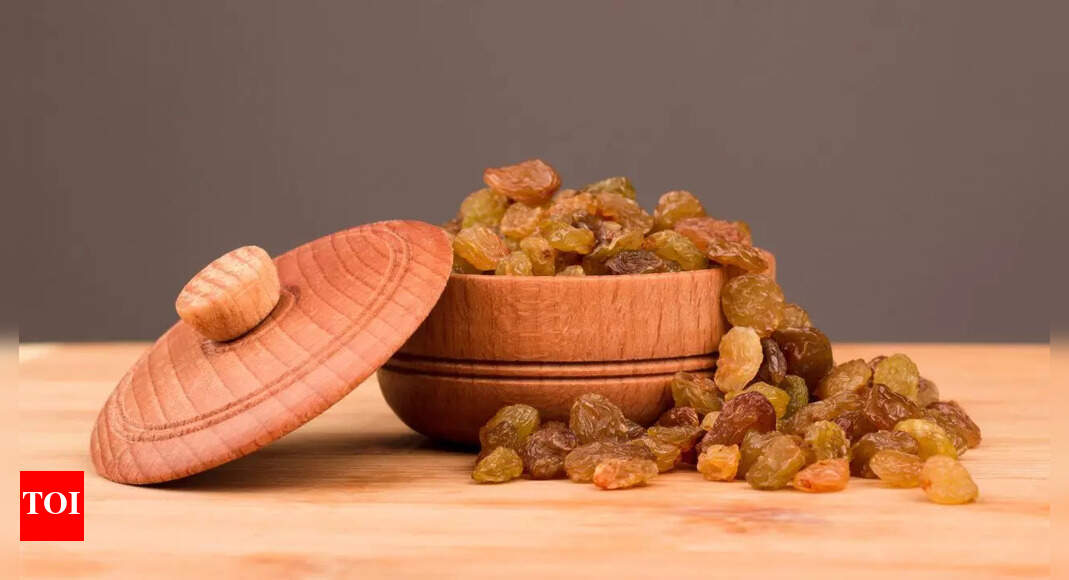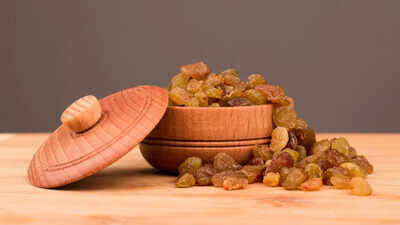
Fruits and dried fruits are nature’s powerhouses, offering concentrated nutrition, energy, and several health benefits. Among them, Kishmish holds a special place in Indian households, from being sprinkled over desserts and biryanis to being used in traditional Ayurvedic remedies. This naturally sweet dried fruit is not just a delightful snack but also a source of essential vitamins, minerals, and antioxidants.Kishmish, known for its chewy texture and natural sweetness, is a staple ingredient in many Indian cuisines and festive dishes. But what exactly is Kishmish called in English, and what makes it such a valuable addition to your diet? Let’s find out its English name, nutritional profile, and the wide range of health benefits it offers.
English name of kishmish: Raisins
In English, Kishmish is called Raisins. Raisins are dried grapes, produced by sun-drying or mechanically drying various types of grapes. They are small, wrinkled, and naturally sweet due to the high concentration of natural sugars that form during the drying process. Depending on the type of grape used, raisins can vary in colour, from golden yellow to dark brown or black.In India, Kishmish typically refers to golden or light brown raisins, often made from seedless grapes. They are rich in iron, potassium, calcium, and antioxidants, and are a quick source of energy, making them ideal for children, athletes, and anyone looking for a healthy snack.
Health benefits of kishmish (Raisins)
1. Boosts energy levelsRaisins are a natural energy booster. Packed with natural sugars like glucose and fructose, they provide quick energy, making them perfect for pre- or post-workout snacks. Their carbohydrate content supports muscle recovery and combats fatigue. According to a study published in the Journal of Strength and Conditioning Research, raisins can be an effective natural alternative to energy gels for endurance athletes, providing similar performance benefits.2. Improves digestionKishmish is rich in dietary fibre, which aids digestion by promoting smooth bowel movements and preventing constipation. The insoluble fibre in raisins absorbs water, adding bulk to the stool and supporting gut health.Soaking raisins overnight and eating them on an empty stomach in the morning is a common Ayurvedic practice known to cleanse the digestive system and relieve acidity.3. Supports heart healthRaisins are heart-friendly. Their potassium and magnesium content help regulate blood pressure and reduce strain on the cardiovascular system. Additionally, the soluble fibre in raisins helps lower LDL (bad) cholesterol levels, reducing the risk of heart disease. A study published in ResearchGate found that regular consumption of raisins can lead to lower blood pressure and improved blood lipid levels in people with mild hypertension.4. Helps manage blood sugar levelsAlthough naturally sweet, raisins have a low to moderate glycaemic index (GI), meaning they do not cause a rapid spike in blood sugar levels when eaten in moderation. The fibre and antioxidants present in raisins help improve insulin response and blood sugar control.A study in the Physician and Sportsmedicine Journal found that individuals with type 2 diabetes who consumed raisins had significantly reduced post-meal glucose levels compared to those who ate other snacks.5. Promotes healthy skin and hairThe antioxidants and vitamin C in Kishmish protect skin cells from oxidative damage, reducing signs of ageing and promoting a healthy glow. Raisins also contain iron, which enhances blood circulation and gives your skin a natural radiance. For hair, the iron and B vitamins in raisins help strengthen hair roots and reduce hair fall. Regular consumption may also help prevent premature greying.6. Strengthens bonesRaisins contain calcium and boron, two vital nutrients for bone health. Boron aids in calcium absorption and helps maintain bone density, especially in postmenopausal women. Regular intake of raisins can therefore help prevent osteoporosis and maintain strong bones and joints.7. Boosts immunityKishmish contains powerful antioxidants like polyphenols, flavonoids, and vitamin C, which strengthen the immune system and protect the body from infections. The antimicrobial properties of raisins also help reduce the risk of common illnesses such as colds and flu.Including soaked raisins in your morning routine can help improve resistance against seasonal infections.8. Improves iron levels and prevents anaemiaOne of the most well-known benefits of raisins is their iron content. Iron, along with vitamin B-complex and copper found in Kishmish, helps in the formation of red blood cells and prevents anaemia. Women, children, and individuals with low haemoglobin levels are often advised to consume a handful of raisins daily.
How to include kishmish (raisins) in your diet
Raisins can be consumed in multiple ways:
- Eat them raw or soaked overnight for better digestion and absorption.
- Add them to oatmeal, smoothies, or yogurt for natural sweetness.
- Use them in baking, puddings, and Indian desserts like halwa, kheer, or sheera.
- Mix them with nuts and seeds for a nutritious trail mix.
However, because they are calorie-dense, it’s best to consume them in moderation, about a small handful per day.Also Read | Is your oat milk spiking blood sugar? Experts reveal 4 ways to control glucose levels








